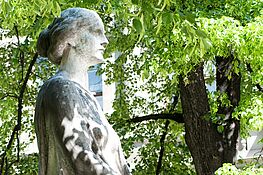As a two-year programme of study with at least one semester abroad studying at a European partner university, Matilda offers students the chance to study with leading European scholars of women’s and gender history.
The curriculum combines core elements with electives ranging from medieval to contemporary (women's and gender) history encouraging comparative and transnational perspectives on European history.
MATILDA is a European Master Degree in Women’s and Gender History. Set up as part of the Erasmus programme with funding from the European Commission, DG Education and Culture, MATILDA was designed for students who wish to develop expertise in women’s and gender history, European history, and intercultural exchange.
The programme spans over two years, includes 120 ECTS points (90 ECTS in Bulgaria) and links six leading European universities in an exciting, innovative and unique venture. The partner institutions are:
- Universität Wien
- Sofia University St. Kliment Ohridski
- Université Lumière Lyon 2 (coordinating institution)
- Central European University (CEU) in Vienna
- Università degli Studi di Padova
- Ruhr-Universität Bochum
Students can expect to study in at least two different countries over the course of four semesters. The MATILDA curriculum includes courses in core subjects of Women's and Gender History (theory, methodology and practice) and electives from medieval ongoing to modern history: History of Nationalism and Post-/Colonialism and History of Post-/Socialism; History of Masculinities; History of Gender in the Sciences; History of Gender and Work; History of Gender and Education; Comparative History of Women’s Movements, Women’s Oral History, Gender and Religion; etc.
MATILDA supports integrative perspectives which go beyond local, regional and national history and puts women's and gender history as well as European history as a whole in a broader context. With its focus on comparative and transnational history MATILDA aims to:
- explore the histories of gender differences and similarities in European cultures and societies
- investigate the role of gender in shaping European history and
- challenge gender inequalities.
Transparency and comparability will be assured on the basis of the European Credit Transfer System (ECTS) and a Diploma Supplement including a Transcript of Records .
The language of instruction at the University of Vienna is German. Language proficiency at level C1 (Common European Framework of Reference for Languages) is therefore mandatory.

